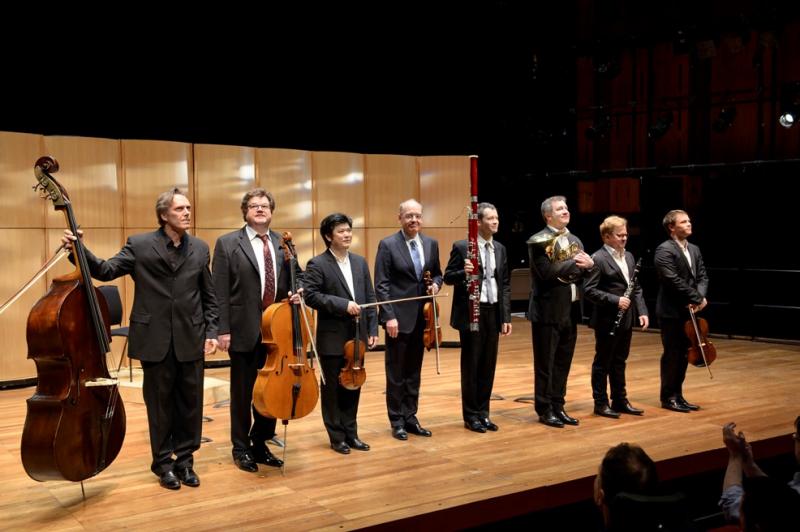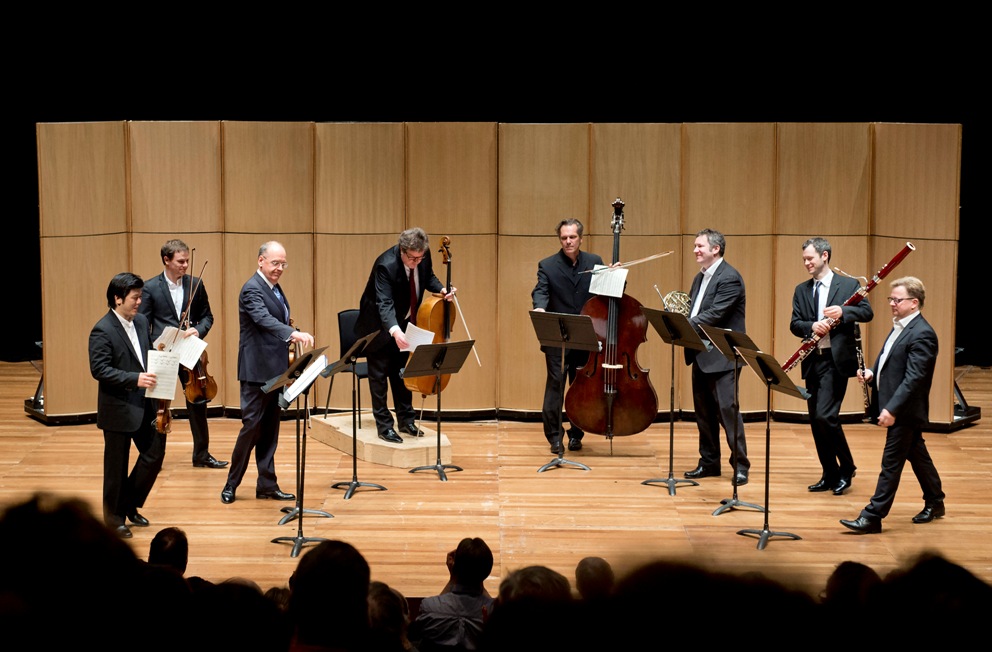Philharmonic Octet Berlin, Queen Elizabeth Hall | reviews, news & interviews
Philharmonic Octet Berlin, Queen Elizabeth Hall
Philharmonic Octet Berlin, Queen Elizabeth Hall
Chamber-musical perfection from eight of the world's best instrumentalists

Even in a big orchestral concert, you’re bound to note Berlin Philharmonic principals as among the best instrumentalists in the world. I cited five in the central instalment of Simon Rattle’s Sibelius cycle on Wednesday. Of those, only viola-player Amihai Grosz figured in the Octet, joined by seven more players of peerless sophistication.
Superficially, the programme could be seen as a bridge between Sibelius at the Barbican and Mahler on the Southbank (performances of the Second Symphony follow tonight and tomorrow; theartsdesk will be covering Sunday’s performance). For the first half, we had two very different Nordic figures, fellow anniversary genius Nielsen and early 19th century Swede Franz Berwald, for the second the colossal Octet by Mahler’s greatest source of inspiration, Schubert. Nielsen’s Serenata in vano for five players was a bonne bouche, but a quirky one: clarinettist Wenzel Fuchs kicked off suggesting klezmer, but the line soon incorporated an unmistakeable Nielsen twist. The humorous Dane evokes the wooer attempting to lure a lady onto her balcony, but even mock-swoony moments don’t do it for her, and a final march-ette sees the band retreating as it plays for its own pleasure: sheer delight in seven minutes.
 Berwald’s Grand Septet really needs to be half-heard while you enjoy a smörgåsbord and a glass of snaps/schnapps, not in reverend silence. Its halfway house between Beethoven and Schubert doesn’t really live up to the latter’s melodic genius. But then if you only half-listened, you wouldn’t have been able to observe the subtlest of turns the POB found in it, while the chirrups and other birdsong of the spirited finale really were on the Schubert level.
Berwald’s Grand Septet really needs to be half-heard while you enjoy a smörgåsbord and a glass of snaps/schnapps, not in reverend silence. Its halfway house between Beethoven and Schubert doesn’t really live up to the latter’s melodic genius. But then if you only half-listened, you wouldn’t have been able to observe the subtlest of turns the POB found in it, while the chirrups and other birdsong of the spirited finale really were on the Schubert level.
His Octet is something else, though, justifying its hour-long serenade with the sudden shades of sadness which pierce through all but the ebullient third-movement Allegro vivace (the players pictured above between movements). Schubert’s a much more democratic sharer of gems between the players than Berwald, too. So we had the essence of songfully vibrated German horn sound from Stefan Dohr in the magical coda of the first movement, Fuchs in perfect harmony with Daishin Kashimoto, one of the Berliner Philharmoniker’s three leaders and a master of nuance, a recap spotlight on bassoonist Mor Biron and a moment in the sun for the string quartet which suggested that just in that format they could be one of the world’s best, with such great listeners as Grosz among them.
The only slight flaw was visual: not enough in the way of obvious enjoyment or smiles for Viennese sunshine. But we heard it even if we didn’t see it; a semi-standing ovation was well deserved. For anyone to whom this looks too blokey, you can catch Berlin horn-player Sarah Willis, also a speaker of such natural charm that she puts quite a few BBC Radio 3 presenters to shame, getting the 12 cellists of the Berliner Philharmoniker to accompany her round-the-world tour for children and adults tomorrow at noon. The treats of this week's residency are far from incidental, and even without Rattle, one of its pleasures of this splendid residency has been to get to know the individual players better.
- Sarah Willis and the 12 cellists tomorrow at noon, in between two performances of Mahler's "Resurrection" Symphony
rating
Share this article
The future of Arts Journalism
You can stop theartsdesk.com closing!
We urgently need financing to survive. Our fundraising drive has thus far raised £49,000 but we need to reach £100,000 or we will be forced to close. Please contribute here: https://gofund.me/c3f6033d
And if you can forward this information to anyone who might assist, we’d be grateful.

Subscribe to theartsdesk.com
Thank you for continuing to read our work on theartsdesk.com. For unlimited access to every article in its entirety, including our archive of more than 15,000 pieces, we're asking for £5 per month or £40 per year. We feel it's a very good deal, and hope you do too.
To take a subscription now simply click here.
And if you're looking for that extra gift for a friend or family member, why not treat them to a theartsdesk.com gift subscription?
more Classical music
 Bizet in 150th anniversary year: rich and rare French offerings from Palazzetto Bru Zane
Specialists in French romantic music unveil a treasure trove both live and on disc
Bizet in 150th anniversary year: rich and rare French offerings from Palazzetto Bru Zane
Specialists in French romantic music unveil a treasure trove both live and on disc
 Scottish Chamber Orchestra, Ibragimova, Queen’s Hall, Edinburgh review - rarities, novelties and drumrolls
A pity the SCO didn't pick a better showcase for a shining guest artist
Scottish Chamber Orchestra, Ibragimova, Queen’s Hall, Edinburgh review - rarities, novelties and drumrolls
A pity the SCO didn't pick a better showcase for a shining guest artist
 Kilsby, Parkes, Sinfonia of London, Wilson, Barbican review - string things zing and sing in expert hands
British masterpieces for strings plus other-worldly tenor and horn - and a muscular rarity
Kilsby, Parkes, Sinfonia of London, Wilson, Barbican review - string things zing and sing in expert hands
British masterpieces for strings plus other-worldly tenor and horn - and a muscular rarity
 From Historical to Hip-Hop, Classically Black Music Festival, Kings Place review - a cluster of impressive stars for the future
From quasi-Mozartian elegance to the gritty humour of a kitchen inspection
From Historical to Hip-Hop, Classically Black Music Festival, Kings Place review - a cluster of impressive stars for the future
From quasi-Mozartian elegance to the gritty humour of a kitchen inspection
 Shibe, LSO, Adès, Barbican review - gaudy and glorious new music alongside serene Sibelius
Adès’s passion makes persuasive case for the music he loves, both new and old
Shibe, LSO, Adès, Barbican review - gaudy and glorious new music alongside serene Sibelius
Adès’s passion makes persuasive case for the music he loves, both new and old
 Anja Mittermüller, Richard Fu, Wigmore Hall review - a glorious hall debut
The Austrian mezzo shines - at the age of 22
Anja Mittermüller, Richard Fu, Wigmore Hall review - a glorious hall debut
The Austrian mezzo shines - at the age of 22
 First Person: clarinettist Oliver Pashley on the new horizons of The Hermes Experiment's latest album
Compositions by members of this unusual quartet feature for the first time
First Person: clarinettist Oliver Pashley on the new horizons of The Hermes Experiment's latest album
Compositions by members of this unusual quartet feature for the first time
 Gesualdo Passione, Les Arts Florissants, Amala Dior Company, Barbican review - inspired collaboration excavates the music's humanity
At times it was like watching an anarchic religious procession
Gesualdo Passione, Les Arts Florissants, Amala Dior Company, Barbican review - inspired collaboration excavates the music's humanity
At times it was like watching an anarchic religious procession
 Classical CDs: Camels, concrete and cabaret
An influential American composer's 90th birthday box, plus British piano concertos and a father-and-son duo
Classical CDs: Camels, concrete and cabaret
An influential American composer's 90th birthday box, plus British piano concertos and a father-and-son duo
 Cockerham, Manchester Camerata, Sheen, Martin Harris Centre, Manchester review - re-enacting the dawn of modernism
Two UK premieres added to three miniatures from a seminal event of January 1914
Cockerham, Manchester Camerata, Sheen, Martin Harris Centre, Manchester review - re-enacting the dawn of modernism
Two UK premieres added to three miniatures from a seminal event of January 1914
 Kempf, Brno Philharmonic, Davies, Bridgewater Hall, Manchester review - European tradition meets American jazz
Bouncing Czechs enjoy their Gershwin and Brubeck alongside Janáček and Dvořák
Kempf, Brno Philharmonic, Davies, Bridgewater Hall, Manchester review - European tradition meets American jazz
Bouncing Czechs enjoy their Gershwin and Brubeck alongside Janáček and Dvořák
 Solomon, OAE, Butt, QEH review - daft Biblical whitewashing with great choruses
Even a top soprano and mezzo can’t make this Handel paean wholly convincing
Solomon, OAE, Butt, QEH review - daft Biblical whitewashing with great choruses
Even a top soprano and mezzo can’t make this Handel paean wholly convincing

Add comment